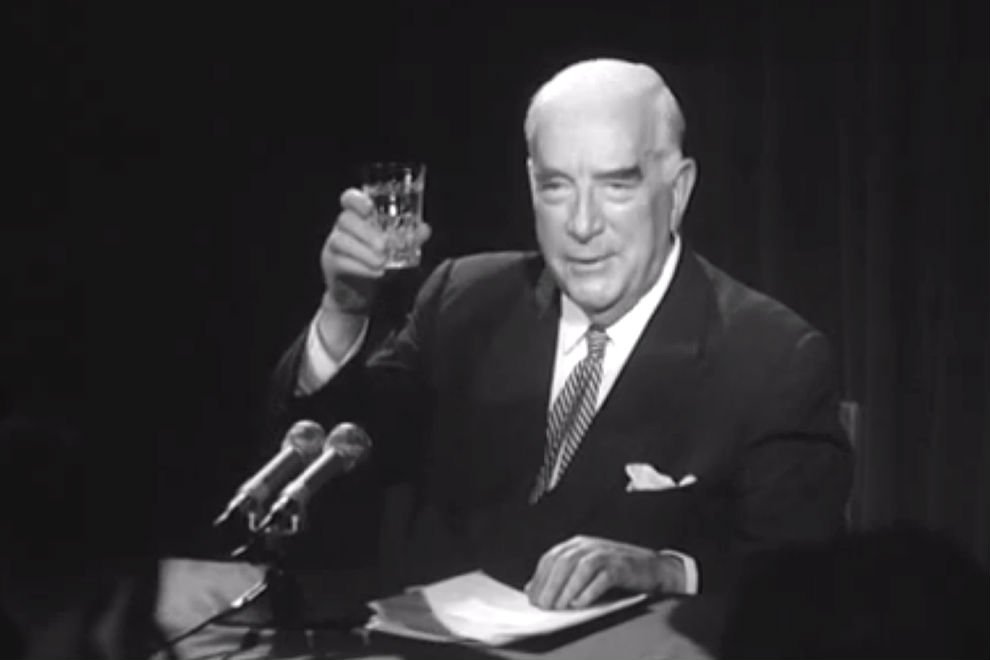On this day, 20 January 1966, Sir Robert Menzies announces his retirement, drawing an end his record stint as Prime Minister, which would officially conclude with his successor’s swearing in on Australia Day. After sixteen unbroken years in the top job, Menzies had overseen a remarkable transformation of his nation, from an insular country still licking its wounds in the aftermath of WW2’s fight for survival, into an upbeat and prosperous economic powerhouse.
Speculation on Menzies’s future had been bubbling away for much of the decade. He had eclipsed Billy Hughes as Australia’s longest serving Prime Minister as early as the mid-1950s, and he may well have been intending to retire after the 1961 election had the result not proven to be so close. This mild speculation had been replaced by something of a fervour, as more recent events indicated that the writing was clearly on the wall. First there was the knighthood in the Order of the Thistle in 1963, a distinction generally reserved for figures who had moved beyond fierce partisanship. Then there was the even more remarkable appointment to the ceremonial position of Lord Warden of the Cinque Ports gazetted on 11 November 1965, a 900year old posting previously held by Winston Churchill.
When Menzies called for a meeting of the Coalition parties for 11am on the 20th ‘to clarify my intentions’, most assumed what was to come. The day before the meeting he informed his Cabinet colleagues that he would no longer be their leader, prompting an outpouring of heartfelt compliments and thankyous. From Country Party Leader Jack McEwen it was ‘God bless you old boy’, for Liberal Deputy Harold Holt Sir Robert was ‘Australia’s greatest son’.
As Menzies climbed the steps out the front of Parliament House, he was met by a crowd of students with eyebrows painted to emulate his prominent brow and who were wearing pins reading ‘Ming don’t Go Go’, one of which they managed to pin to Holt’s lapel. After Menzies let the wider Coalition in on the scarcely concealed secret there was a Liberal Party meeting which duly promoted Holt from his position as deputy to replacement leader. Menzies was met by his wife and daughter Heather for the drive to Government House where he gave his resignation to the Governor General, who happened to be his former Minister Lord Richard Casey.
In a press release Menzies explained that he was 71, tired, and keen to ensure that his successor had time to establish themselves before the next election, which was due by the end of the year:
‘It would be idle for me to pretend that all these years and tasks have not affected me. There is an accumulating wear and tear of which I have been increasingly conscious for some years. The thought of going through another election campaign would depress me. Speech-making has become a burden, since every speech presents its own problems. Though I still work long hours, I can no longer sustain the very long hours of work which once delighted me. In short, I am tired; my pace has slowed down; I could not properly continue in office for very much longer and at the same time do justice to the growing problems of the nation.’
That night at 8pm Menzies held a unique live press conference, broadcast on Australian television and radio to an unprecedentedly large audience. He remarked to the assembled journalists that ‘this is something that doesn’t happen very frequently — for a man to go out of office under his own steam…I’ve gone out of office before today under somebody else’s steam, but this time under my own.’ Asked what his most significant achievement was, he listed the formation of the Liberal Party, the healthy relationship he maintained with the Country Party, the ANZUS Treaty, and the expansion of Australia’s universities. After 50minutes it was over, Sir Robert exited the public stage.
Menzies retired from politics with little wealth to his name. A dedication to public service had come at the expense of what had been a brilliant but short-lived career at the bar that would undoubtedly have made him rich. Because of this, in 1965 a group of supporters offered to buy him a house to accommodate Sir Robert when he finally left the Lodge. It was an idea Menzies had resisted, until he acquiesced under the condition that once he passed on the house would be sold and the proceeds given away. So it was that Menzies and Dame Pattie retired to 2 Haverbrack Avenue Malvern, the address at which Sir Robert would spend his final years.
Further Reading:
Troy Bramston, Robert Menzies: The Art of Politics (Scribe, 2019).
A.W. Martin, Robert Menzies, A Life Volume 2 1944-1978 (Melbourne University Press, 1999).
Footage of Menzies’s retirement press conference can be viewed here MENZIES RETIRES – SOUND – YouTube
Sign up to our newsletter
Sign up for our monthly newsletter to hear the latest news and receive information about upcoming events.


